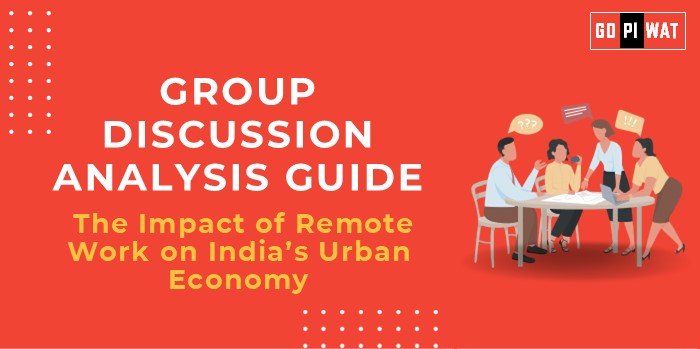📋 Group Discussion (GD) Analysis Guide: The Impact of Remote Work on India’s Urban Economy
🌐 Introduction to the Topic
Remote work has reshaped global labor markets, particularly impacting India’s urban economy. This shift influences real estate, employment patterns, and urban planning.
The COVID-19 pandemic brought remote work into the mainstream, significantly altering urban dynamics in India. Industries, governments, and individuals are now navigating this transformation, which has long-term implications for metropolitan and smaller cities.
📊 Quick Facts and Key Statistics
- Urban Workforce Remote Potential: The World Economic Forum (2024) states that 25% of global digital jobs can currently be performed remotely, with projections suggesting this number could grow to 92 million jobs by 2030.
- Urban Real Estate Impact: Indian metros report a 20-25% drop in office space demand since 2020, prompting companies to adopt hybrid models.
- Economic Redistribution: Around 30% of IT professionals in India have relocated to Tier 2/3 cities, influencing local economies (NASSCOM).
- Employee Preferences: 98% of employees globally prefer hybrid or remote work arrangements, highlighting its enduring appeal (Forbes, 2024).
👥 Stakeholders and Their Roles
- Government: Develops digital infrastructure, promotes policies supporting remote work, and plans urban revitalization strategies.
- Corporates: Implements hybrid work models and invests in technology to ensure productivity.
- Real Estate Developers: Re-purpose underutilized office spaces into residential or co-working spaces.
- Employees: Seek flexibility, reduced commuting, and improved work-life balance.
🏆 Achievements and ⚠️ Challenges
Achievements:
- Reduced Urban Congestion: Remote work has led to decreased commuting, cutting traffic congestion in cities like Bengaluru and Delhi by 20%.
- Increased Productivity: Studies show a 15-20% rise in productivity among remote workers (Microsoft Work Index, 2024).
- Regional Economic Growth: Smaller cities like Pune and Coimbatore report economic boosts due to IT professionals relocating.
Challenges:
- Digital Divide: Only 20% of rural households have stable internet, limiting remote work accessibility.
- Urban Business Decline: Cafes, transportation, and local services in metros face revenue drops due to reduced foot traffic.
- Infrastructure Underutilization: Office spaces and transportation infrastructure remain underused in major metros.
🌍 Global Comparisons:
- San Francisco, USA: Reports 30% office vacancy rates, spurring discussions on repurposing urban spaces.
- China: Adopts hybrid work models, integrating smart city solutions for remote productivity.
📂 Structured Arguments for Discussion
- Supporting Stance: “Remote work boosts productivity and provides economic opportunities for smaller cities, fostering balanced urban development.”
- Opposing Stance: “The shift to remote work has weakened metropolitan economies, creating underutilized infrastructure and harming local businesses.”
- Balanced Perspective: “Remote work fosters flexibility and regional growth but demands strategic urban adaptation to mitigate metropolitan economic challenges.”
📖 Effective Discussion Approaches
- Opening Approaches:
- “The remote work revolution has shifted urban economies, influencing real estate and regional growth across India.”
- “With 25% of global jobs now remote-ready, the implications for India’s urban and regional economies are profound.”
- Counter-Argument Handling:
- Highlight investments in digital infrastructure to address the digital divide.
- Use global examples, such as San Francisco’s adaptive policies, to illustrate potential solutions.
📈 Strategic Analysis of Strengths and Weaknesses
- Strengths: Increased flexibility, regional economic growth, reduced urban congestion.
- Weaknesses: Digital divide, reduced metro economic activity, underutilized infrastructure.
- Opportunities: Development of smart cities, hybrid office spaces, improved rural connectivity.
- Threats: Urban stagnation, cybersecurity risks, inequality in digital access.
📚 Connecting with B-School Applications
- Real-World Applications: Insights for urban planning, real estate finance, and public policy.
- Sample Interview Questions:
- “What strategies can support metropolitan economies amidst rising remote work trends?”
- “How can remote work inclusivity be ensured across urban and rural areas in India?”
- Insights for B-School Students: Importance of hybrid models, urban-rural collaborations, and digital infrastructure investments.


